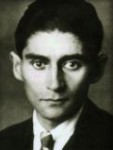I’m guessing I was in high school when I first heard the word “existential” or “existentialism.” Likewise, I’m guessing that was when I first grasped even a glimmer of what it meant — and I am still far from claiming comprehension. One thing I’ve always found unique about existentialism is fiction’s role in it. Ask almost anyone who knows something about the philosophy and names like Sartre, Camus and the one who struck me most, Franz Kafka, come to mind almost immediately. All this meandering comes about because today is the 130th anniversary of Kafka’s birth.
I’ve always found Sartre somewhat dense reading, even his fiction. Camus is okay but Kafka’s writing always sucked me in. My concept of existentialism is far more feel than definitional. And Kafka’s works seem to most embody that sense.
 Kafka puts his characters in situations that seem absurd and hopeless but in which they continue to struggle through their existence. That aspect of existentialism is a key part of my sense of it. Life is difficult, poses problematic questions about the human condition, and can seem meaingless. Anxiety and even despair often result. But when confronted with these situations, the human animal can only attempt to make something of it through their own actions. Although there’s a good chance those actions may not resolve the situation, both the freedom to make those decisions and their consequences are absolute.
Kafka puts his characters in situations that seem absurd and hopeless but in which they continue to struggle through their existence. That aspect of existentialism is a key part of my sense of it. Life is difficult, poses problematic questions about the human condition, and can seem meaingless. Anxiety and even despair often result. But when confronted with these situations, the human animal can only attempt to make something of it through their own actions. Although there’s a good chance those actions may not resolve the situation, both the freedom to make those decisions and their consequences are absolute.
Take Josef K. of The Trial, Kafka’s most famous novel. An impersonal process has been set in motion for no comprehensible reason and Josef will struggle futilely against it. Likewise, in The Castle the protagonist is a land surveyor sent to survey the castle’s land but cannot reach it despite all his efforts to do so. In his most famous short story, “Metamorphosis,” Gregor never questions how or why he is transformed into a cockroach and Gregor’s life is such that he is trapped whether as a human or a grotesque insect. And, from my perspective, both situations seem to center around the decisions Gregor has made in his life. Then “In the Penal Colony” finds an outsider confronted with what he believes is an injustice but he is powerless to change. Still, while everything Kafka wrote is, by definition, Kafkaesque, it doesn’t all fit the meaning that term has today.
Lots of people read elements of Kafka’s life into his works, particularly his relationship with his authoritarian father. In fact, in a letter to his father — more than 100 pages long — that was never sent, Kafka said, “My writing was all about you.” It may well be that the relationship is a source of Kafka’s themes of alienation, oppression and isolation.
And while Kafka’s writing was a source of contention between he and his father, little of Kafka’s work was published before he died at age 40. In fact, none of his novels were published before then. The Trial was published the year after Kafka died and The Castle a year later. Before his death, Kafka left explicit instructions that all his writings “be burned unread.” His literary executor ignored those instructions and much of Kafka’s work, even unfinished, was published. Yet decades after his death, legal battles still occurred over ownership and treatment of Kafka’s papers.
A part of me is a bit offended that Kafka’s express instructions weren’t honored. At the same time, the world would have missed out on a lot had the executor obeyed. And given the anniversary of his birth, maybe it’s time I got back to his Complete Stories after having let it sit too long.
UPDATE:
Google marked the anniversary with the following on its search page:
You can hold yourself back from the sufferings of the world, that is something you are free to do and it accords with your nature, but perhaps this very holding back is the one suffering you could avoid.
Franz Kafka, Shorter Works, Vol. 1








